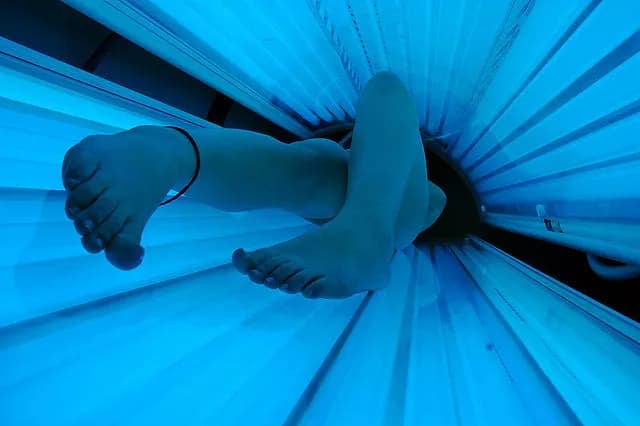
Tanning Dependence Linked To Other Addictive Behaviors, New Study Finds
Despite the known dangers of exposure to ultraviolet light, many people continue to sunbathe and use indoor tanning beds with some users exhibiting a dependence to tanning. A new study from the Yale School of Public Health finds that such dependence is also associated with other addictive behaviors.
The study, recently published in the Journal of the European Academy of Dermatology and Venereology, surveyed 499 people who had previously sunbathed or used a tanning bed, and revealed that those who exhibited tanning dependence, also referred to as tanning addiction, were six times as likely to also be dependent on alcohol and three times as likely to suffer from Seasonal Affective Disorder (SAD).
"We hope our findings will help researches design interventions specifically targeted to help people who are tanning dependent and thus reduce skin cancers," said Brenda Cartmel, Ph.D., the paper's lead author and senior research scientist and lecturer in the school's Department of Chronic Disease Epidemiology.
The connections between tanning dependence and other disorders revealed by the study represent an opportunity for clinicians to address those related conditions. "People who are tanning dependent could also be assessed for SAD," said Cartmel. "There are ways of addressing SAD other than indoor tanning. Regarding the alcohol dependence association, it may be possible that addressing that behavior could help address tanning dependence."
The underlying mechanisms for the addiction to UV light are not yet fully understood. According to other studies, "The biological rationale for tanning dependence is that exposure to UV light results in both melanin, and endorphin production," said Cartmel.
She also added that there was another interesting preliminary finding: those with tanning dependence were five times more likely to exhibit "exercise addiction." She said it is too early, however, to determine the implication. "Exercise addiction" itself has really not been well researched," she said.
"One hypothesis behind the finding is that people who exercise excessively do so because they are very aware of their appearance, and they also feel that being tanned improves their appearance. Or it may be that we will eventually find out that these individuals have more of an addictive or risk-taking personality type. If you have one type of dependence, you may be more likely to have another addiction," Cartmel said.
YSPH researchers have previously found a strong association between indoor tanning and basal cell carcinoma, a type of non-melanoma skin cancer. In 2013, YSPH researchers testified before a state legislative committee about the health risks posed by indoor tanning. The legislature subsequently passed a law banning the use of indoor tanning beds by those under 17.
Materials provided by Yale Cancer Center. Note: Content may be edited for style and length.
Disclaimer: DoveMed is not responsible for the accuracy of the adapted version of news releases posted to DoveMed by contributing universities and institutions.
Primary Resource:
Cartmel, B., Bale, A. E., Mayne, S. T., Gelernter, J. E., DeWan, A. T., Spain, P., ... & Ferrucci, L. M. (2017). Predictors of tanning dependence in white non‐Hispanic females and males. Journal of the European Academy of Dermatology and Venereology. DOI: 10.1111/jdv.14138
Related Articles
Test Your Knowledge
Asked by users
Related Centers
Related Specialties
Related Physicians
Related Procedures
Related Resources
Join DoveHubs
and connect with fellow professionals

0 Comments
Please log in to post a comment.